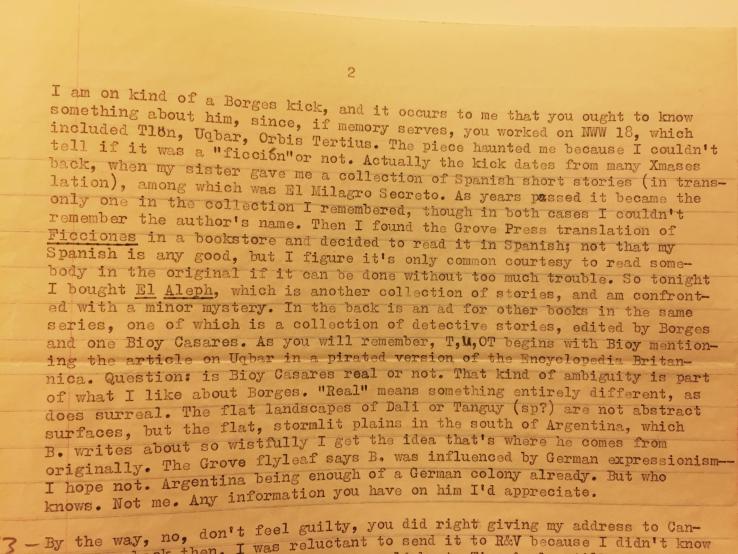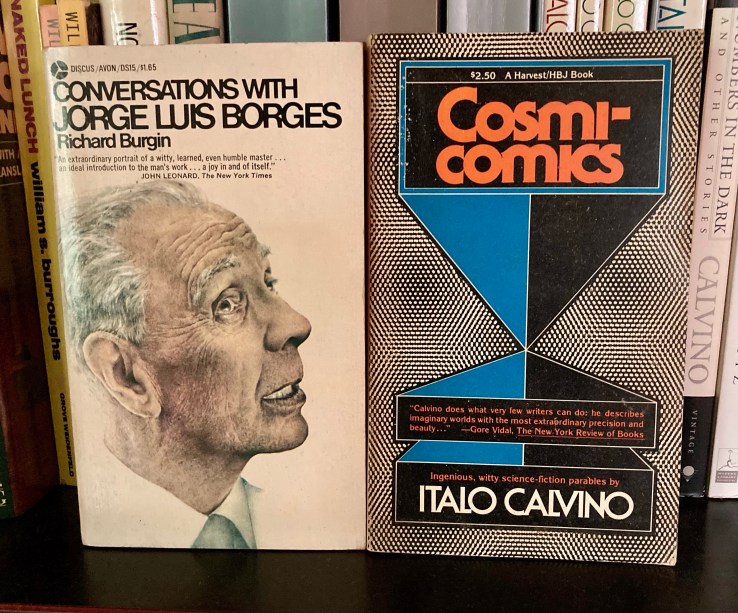“The Wizard Postponed”
by
Jorge Luis Borges
Translated by Norman Thomas di Giovanni
In the city of Santiago, there was a dean who had a burning desire to learn the art of magic. Hearing that don Illán of Toledo knew more about magic than anyone else, the dean went to Toledo in search of him.
The very morning he arrived, he went straight to don Illán’s and found him reading in a room at the back of his house. Don Illán received the dean cordially and asked him to postpone telling him the object of his visit until after they had eaten. Showing his guest into pleasant quarters, don Illán said he felt very happy about the dean’s visit. After their meal, the dean told don Illán why he had come, and he begged to be taught the craft of magic. Don Illán said that he already knew that his guest was a dean, a man of good standing and of good prospects, but that were he to teach him all his knowledge, the day might come when the dean would fail to repay his services as men in high places are often wont to do. The dean swore that he would never forget Don Illán’s bounty and that he would always be at his call. Once they came to an agreement, don Illán explained that the magic arts could not be learned save in a place of deep seclusion, and, taking the dean by the hand, he led him to the next room, in whose floor there was a large iron ring. Before this, however, he told the serving maid to prepare partridges for supper but not to put them on to roast until he so ordered.
Don Illán and his guest lifted the ring and went down a well-worn, winding stairway until it seemed to the dean they had gone down so far that the bed of the Tagus must now be above them. At the foot of the staircase was a cell, and in it were a library of books and a kind of cabinet with magic instruments. They were leafing through the books, when suddenly two men appeared bearing a letter for the dean, written by the bishop, his uncle, in which the bishop informed him that he was gravely ill, and that if the dean wanted to find him alive he should not tarry. The news was very upsetting to the dean for one thing, because of his uncle’s illness; for another, because he would be forced to interrupt his studies. In the end, choosing to stay, he wrote an apology and sent it to the bishop. Three days passed, and there arrived several men in mourning bearing further letters for the dean, in which he read that the bishop had died, that a successor was being chosen, and that they hoped by the grace of God that the dean would be elected. The letters advised him to remain where he was, it seeming better that he be absent during his election.
Ten days elapsed, and two finely dressed squires came, throwing themselves down at the dean’s feet and kissing his hands and greeting him as bishop. When don Illán saw these things, he turned to the new prelate with great joy and said that he thanked the Lord that such good news should have come to his house. He then asked for the now vacant deanery for his son. The bishop answered that he had already set aside the deanery for his own brother but that he would find the son some post in the Church, and he begged that they all three leave together for Santiago.
They made their way to the city of Santiago, where they were received with honours. Six months passed, and messengers from the pope came to the bishop, offering him the archbishopric of Toulouse and leaving in his hands the naming of a successor. When don Illán heard this, he reminded the archbishop of his old promise and asked for the vacated title for his son. The archbishop told him that he had already set aside the bishopric for his own uncle, his father’s brother, but that as he had given his word to shed favour on don Illán, they should, together with the son, all leave for Toulouse. Don Illán had no recourse but to agree .The three set out for Toulouse, where they were received with honours and Masses. Two years passed, and messengers from the pope came to the archbishop, elevating him to the cardinalate and leaving in his hands the naming of a successor. When don Illán learned this, he reminded the cardinal of his old promise and asked for the vacant title for his son. The cardinal told him that he had already set aside the archbishopric for his own uncle, his mother’s brother a good old man but that if don Illán and his son were to accompany him to Rome, surely some favourable opportunity would present itself. Don Illán protested, but in the end he was forced to agree.
The three then set out for Rome, where they were received with honours, Masses, and processions. Four years elapsed, and the pope died, and our cardinal was elected to the papacy by all the other cardinals. Learning of this, don Illán kissed His Holiness’s feet, reminded him of his old promise, and asked for the vacant cardinal’s office for his son. The pope told don Illán that by now he was weary of his continued requests and that if he persisted in importuning him he would clap him in gaol, since he knew full well that don Illán was no more than a wizard and that in Toledo he
had been a teacher of the arts of magic.
Poor don Illán could only answer that he was going back to Spain, and he asked the pope for something to eat during the long sea journey. Once more the pope refused him, whereupon don Illán (whose face had changed in a strange fashion) said in an unwavering voice, ‘In that case, I shall have to eat the partridges that I ordered for tonight.’
The serving maid came forward, and don Illán ordered the partridges roasted. Immediately the pope found himself in the underground cell in Toledo, no more than dean of Santiago, and so taken aback with shame that he did not know what to say. Don Illán said that this test was sufficient, refused the dean his share of the partridges, and saw him to the door, where, taking leave of him with great courtesy, he wished him a safe journey home.
From the Libro de los enxiemplos del Conde






